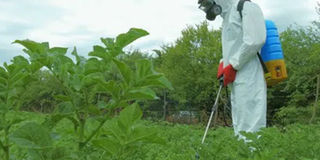Review Uganda’s use of pesticides

What you need to know:
The issue: Pesticides
Our view: Lax regulation of pesticide use must not deny inhabitants of Uganda sources of clean food while predisposing them to non-communicable diseases.
Revelations that the government of Uganda’s relaxed approach to agricultural chemical use has translated into heavy deployment of harmful pesticides in food production should not be treated lightly. Yet, remarkably, our Agriculture ministry green-lit glyphosate in July. The clearance came eight years after the World Health Organization’s cancer research arm came to the conclusion that the herbicide is “probably carcinogenic to humans.” Glyphosate is far from being the only agricultural and veterinary or agvet chemical to elude Uganda’s feeble monitoring of pesticide and herbicide residues in food. Despite getting the red flag elsewhere, cypermethrin is, for one, applied to the country’s maize, coffee, and tomato plants.
Elsewhere, it is left to the self-regulatory system of the country’s fresh food markets to make out what concentrations of mancozeb and carbosulfan are in the agriculture industry. The use—at industrial scales—of such dangerous chemicals banned across the western world has prompted concerns about runoff into waterways.
In fact, a recent peer-reviewed study published in the Journal of Food Safety and Hygiene found that reducing pesticide exposure by washing fruit and vegetables comes to naught. This is simply because the vast bulk of water sources is clogged with poisonous substances. All of this is deeply disturbing not least because the aforesaid study and others have made clear that human exposure to chemical pesticides is linked to chronic illnesses, including cancer, and heart, respiratory and neurological diseases.
While we are alive to the fact that agvet chemicals protect crops, livestock and domestic animals, farmers who use them to safeguard the environment from weeds and pests owe consumers a duty of care. Assurances by the government that plans to have in place a pesticides regulator sooner rather than later is a step in the right direction. Ditto the current evaluation of 15 agvet chemicals for possible de-registration. We also strongly recommend that testing of food sold in the country is not largely left to the fresh food markets under a self-regulatory system. It is evident that the furniture in the Uganda National Bureau of Standards as well as National Drug Authority needs to be rearranged. Risk assessments and reviews of agvet products are conspicuous by their absence. This is a damning indictment on both parastatals propped by the taxpayer.
All said, the environmental and health effects of pesticides and other agricultural chemicals cannot be wished away.
Efforts to substantially reduce use of pesticides in agriculture have to be accelerated. While agricultural pesticide use has benefits insofar as reducing food loss is concerned, caution should always be the byword. Toxic pesticides must be red-flagged on health and environmental grounds. Lax regulation of pesticide use must not deny inhabitants of Uganda sources of clean food while predisposing them to non-communicable diseases.
Our commitment to you
We pledge:
- To be accurate and fair in all we do.
- To be respectful to all in our pursuit of the truth.
- To refuse to accept any compensation beyond that provided by Monitor Publications Ltd. for what we do in our news gathering and decision-making.
Further, we ask that we be informed whenever you feel that we have fallen short in our attempt to keep these commitments.




